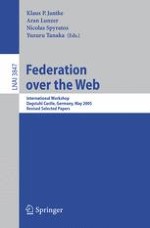The lives of people all around the world, especially in industrialized nations, continue to be changed by the presence and growth of the Internet. Its in?uence is felt at scales ranging from private lifestyles to national economies, boosting thepaceatwhichmoderninformationandcommunicationtechnologiesin?uence personal choices along with business processes and scienti?c endeavors. In addition to its billions of HTML pages, the Web can now be seen as an open repository of computing resources. These resources provide access to computational services as well as data repositories, through a rapidly growing variety of Web applications and Web services. However, people’s usage of all these resources barely scratches the surface of the possibilities that such richness should o?er. One simple reason is that, given the variety of information available and the rate at which it is being extended, it is di?cult to keep up with the range of resources relevant to one’s interests. Another reason is that resources are o?ered in a bewildering variety of formats and styles, so that many resources e?ectively stand in isolation. This is reminiscent of the challenge of enterprise application integration, - miliar to every large organization be it in commerce, academia or government. Thechallengearisesbecauseoftheaccumulationofinformationandcommuni- tion systems over decades, typically without the technical provision or political will to make them work together. Thus the exchange of data among those s- tems is di?cult and expensive, and the potential synergetic e?ects of combining them are never realized.
